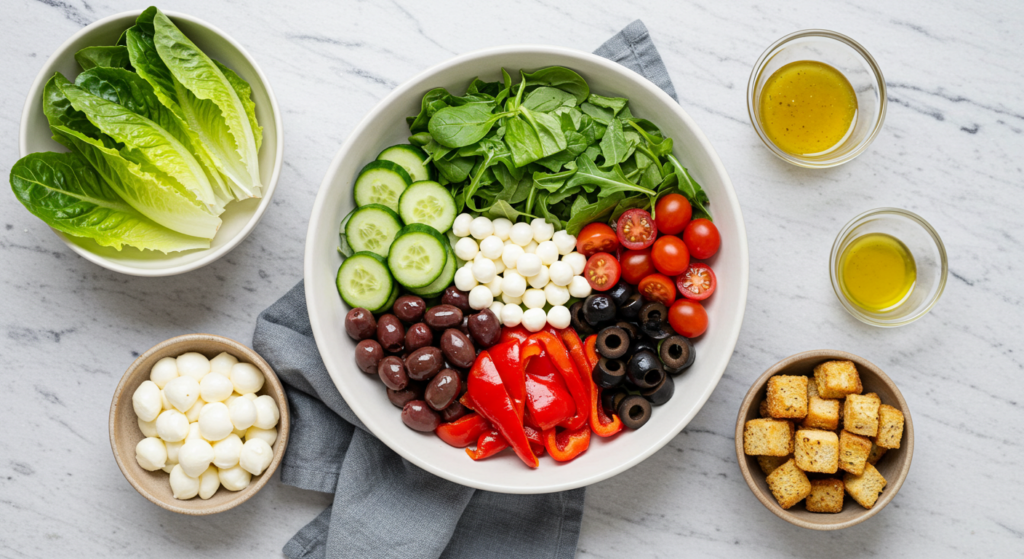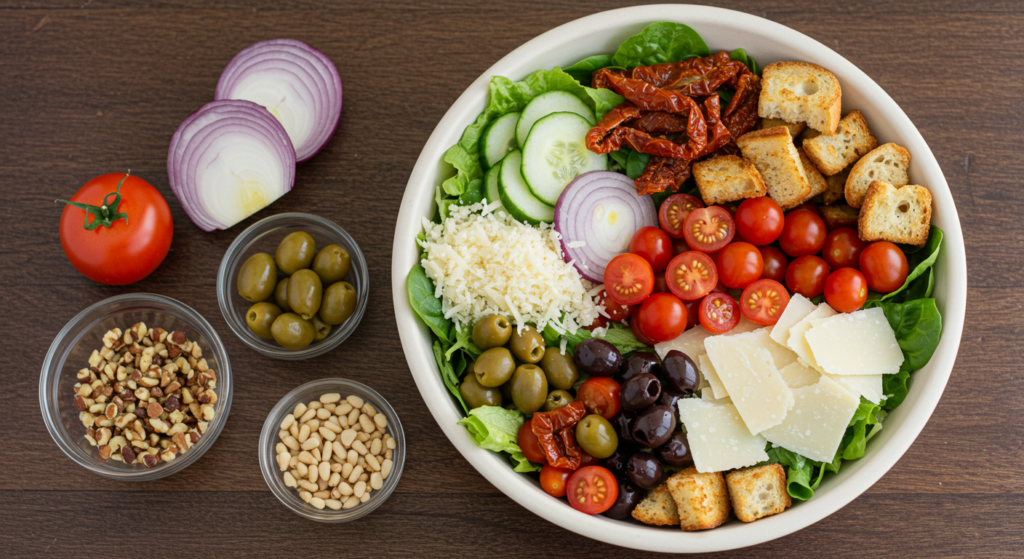
7 Ingredients for the Best Simple Italian Salad Recipe”
Craving a light, vibrant dish that bursts with Mediterranean charm? Let’s dive into a timeless recipe that celebrates fresh flavors and effortless preparation. This dish combines crisp textures, bright colors, and a homemade dressing to elevate everyday meals or special gatherings.
At its core, this recipe relies on quality produce and balanced flavors. Think juicy tomatoes, peppery arugula, and briny olives paired with creamy cheese. The dressing—a zesty blend of olive oil, herbs, and citrus—ties everything together without overpowering the natural tastes.
You’ll discover tips for selecting the best seasonal items, along with ways to customize toppings based on what’s in your pantry. We’ll also cover how to layer ingredients for maximum visual appeal and crunch. Whether you’re hosting a dinner party or prepping weekday lunches, this guide ensures delicious results every time.
Table of Contents
Key Takeaways Simple Italian Salad
- Focus on fresh, high-quality components to enhance flavor and texture.
- Learn to create a versatile homemade dressing with pantry staples.
- Discover pairing ideas to complement main dishes or stand alone.
- Adapt the recipe using seasonal produce or dietary preferences.
- Master assembly techniques for optimal taste and presentation.
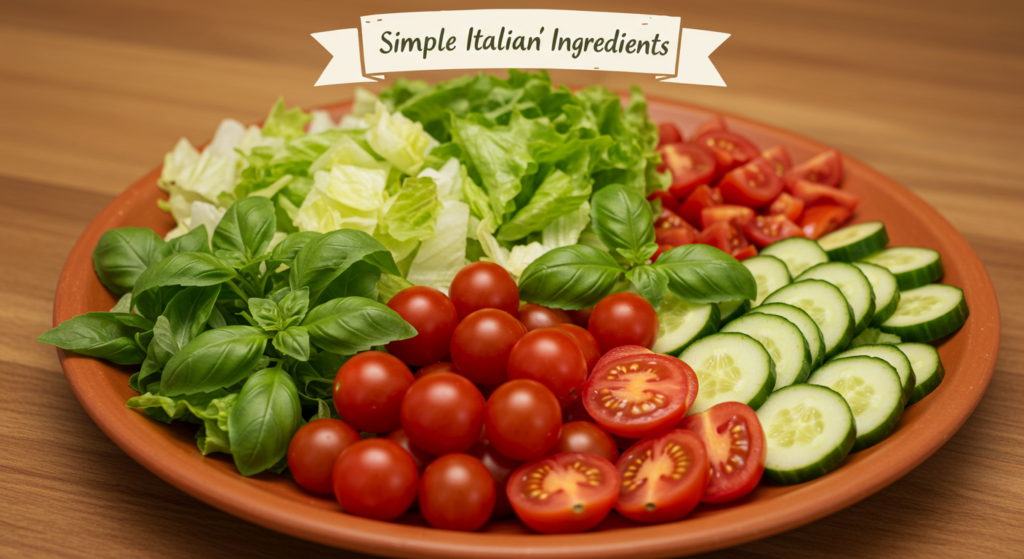
Fresh Italian Salad: A Delicious Introduction
Imagine a plate that brings the sunlit energy of a trattoria to your table. Crisp greens mingle with juicy tomatoes, while briny olives add a salty kick. A drizzle of golden olive oil and tangy dressing ties it all together—no reservation required.
The Appeal of Italian Salads
What makes these dishes unforgettable? It’s the harmony of textures and flavors. Crunchy cucumbers balance silky cheeses, and peppery arugula contrasts with sweet basil. Restaurants like Olive Garden showcase this balance, but your kitchen can rival theirs. As one chef notes: “Great salads let each ingredient sing.”
Central to the magic is quality olive oil. It transforms basic veggies into something luxurious. Paired with a zesty dressing—think lemon, garlic, and herbs—it brightens every bite without overwhelming.
Overview of a Classic Recipe Post
This guide focuses on a timeless combination: ripe tomatoes, plump olives, and fresh greens. The result? A dish that’s light yet satisfying. Serve it as a side with grilled meats or pasta, or enjoy it solo for lunch.
Versatility is key. Swap veggies based on the season or add nuts for crunch. Whether you’re hosting friends or fueling a busy day, this recipe adapts effortlessly. It’s proof that good food doesn’t need complexity—just care and quality.
Simple Italian Salad Ingredients
Building a memorable dish starts with thoughtfully chosen components. Freshness and pantry essentials work together here, creating layers of flavor that transform basic elements into something extraordinary.
Key Ingredients and Their Benefits
Plump cherry tomatoes steal the spotlight with their sun-ripened sweetness. Their thin skins burst with juice, adding moisture to every forkful. For best results, choose varieties like Campari or heirloom—their vibrant colors signal peak flavor.
A generous pinch of salt isn’t just seasoning—it’s science. It draws out natural juices, creating a light dressing as it mingles with other elements. As chef Lidia Bastianich notes: “Salt wakes up flavors you didn’t know were sleeping.”
Use a wide, shallow bowl to toss everything gently. This prevents crushing delicate greens while ensuring even coating.
Pantry Staples that Enhance Flavor
Extra-virgin oil acts as the glue, binding sharp and sweet notes into harmony. Its fruity undertones elevate raw veggies without overpowering them.
Wine vinegar delivers a tangy punch that cuts through richness. Red varieties add depth, while white offers brighter acidity. Balance it with a drizzle of oil to round out sharp edges.
Don’t underestimate salt’s role here, either. A second sprinkle post-mixing heightens aromatics and ensures every bite sings.
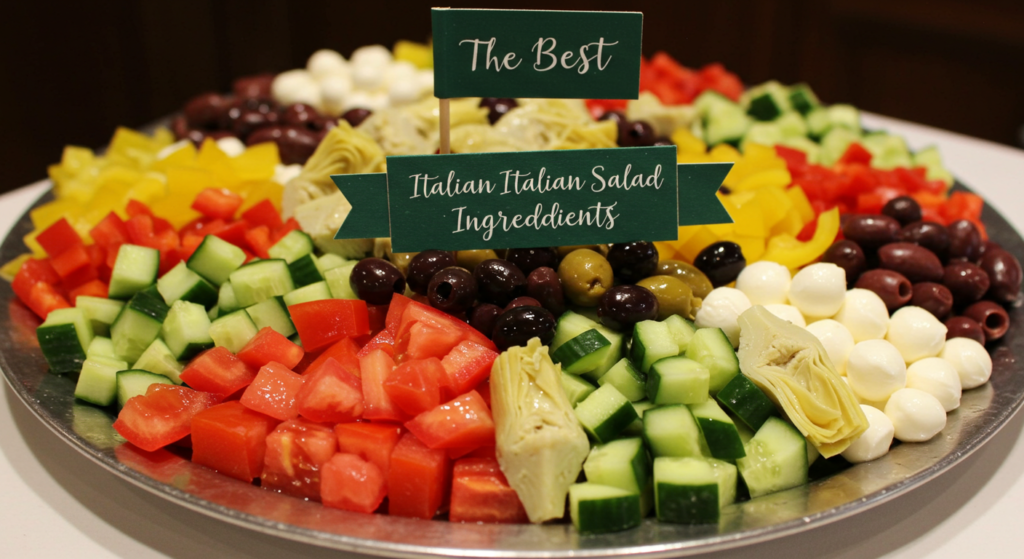
Crafting Your Italian Dressing Masterpiece
Transform your greens with a dressing that’s as bold as it is balanced. The secret lies in layering sharp, salty, and sweet notes—all while letting each component shine. A great vinaigrette acts like a flavor conductor, harmonizing fresh produce without stealing the show.
Homemade Italian Vinaigrette Essentials
Start with quality extra-virgin olive oil as your base. Combine it with red wine vinegar for tanginess—a classic 3:1 ratio works well. Add finely diced red onions for sharpness, briny chopped olives for depth, and roasted peppers for sweetness. “Acidity is your friend here,”says chef Marcella Hazan. “It lifts heavier elements like oil and cheese.”
Flavor Variations and Pro Tips Simple Italian Salad
Swap vinegar types to tweak the profile. Balsamic adds richness, while white wine brings brightness. For herb lovers, mix in oregano or basil. To keep the emulsion stable, whisk vigorously or shake in a jar with a pinch of mustard.
- Balance salty olives with sweet honey or maple syrup
- Use shallots instead of onions for milder sharpness
- Add chili flakes to roasted peppers for heat
Store leftovers in an airtight container—the flavor intensifies overnight. Always taste before serving, adjusting salt or acid as needed.
Elevating Flavors with Vibrant Veggies & Toppings
Transform ordinary bowls into culinary art through bold combinations of textures and hues. The right mix of crisp greens, savory accents, and crunchy elements turns a side dish into the star of your table.
Selecting Fresh Greens and Veggies
Start with lively greens like radicchio’s purple splashes or romaine’s sturdy crunch. These bases add visual drama while delivering vitamins. Pair them with thinly sliced cucumbers or roasted red pepper strips for contrasting sweetness.
| Green Type | Flavor Profile | Best Pairings |
|---|---|---|
| Radicchio | Bitter, earthy | Sweet corn, feta |
| Romaine | Mild, crisp | Cherry tomatoes, pine nuts |
| Arugula | Peppery | Figs, goat cheese |
Farmer’s markets often showcase peak-season picks. Look for firm stems and vibrant colors—limp leaves dull both taste and presentation.
Adding Cheese, Olives, and Croutons
A ¾ cup of cubed mozzarella or shaved parmesan adds creamy richness. Balance salty kalamata olives (aim for ½ cup) with toasted croutons rubbed with garlic. For crunch, try this trick from chef Carla Lalli Music: “Toss day-old bread in olive oil and black pepper before baking—it’s worth the extra time.”
Creative topping ideas from popular recipes:
- Marinated artichokes with lemon zest
- Candied walnuts drizzled with honey
- Quick-pickled onions using red wine vinegar
These additions turn quick lunches into satisfying meals. Pair your creation with light wine options like Pinot Grigio to let flavors shine.
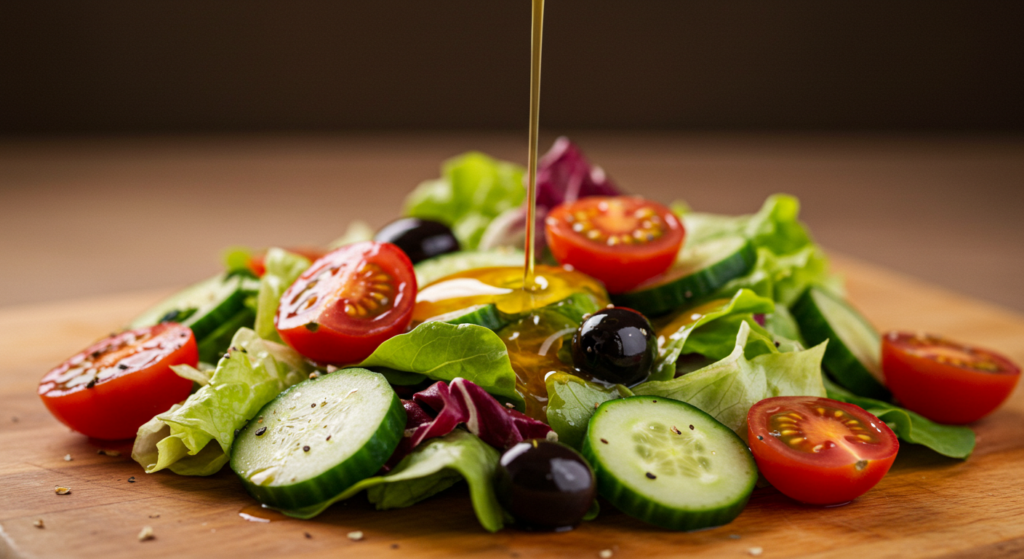
Step-by-Step Assembly and Preparation Tips Simple Italian Salad
Mastering the art of assembly transforms fresh components into a cohesive dish. Follow these techniques to preserve texture and amplify flavors from first chop to final toss.
Prepping and Chopping Simple Italian Salad Ingredients
Start by rinsing cherry tomatoes under cold water—pat them dry to prevent dilution of flavors. Slice vertically to maintain their oval shape, keeping juices intact. For crispness, chop cucumbers into thick matchsticks rather than thin rounds.
Measure dried oregano precisely: 1 teaspoon provides earthy depth without bitterness. Crush it between your palms before adding to release aromatic oils. As chef Samin Nosrat advises: “Your hands are your best tools for unlocking hidden flavors.”
Mixing Techniques for Crispness
Combine dressing elements in a lidded jar. Add 3 teaspoons of red wine vinegar, ½ teaspoon of honey, and 1 teaspoon of oregano. Shake vigorously for 20 seconds—this emulsifies fats and acids while evenly dispersing herbs.
Layer greens first in your bowl, followed by veggies and cheese. Pour dressing along the edges to coat leaves without crushing them. Toss with salad servers or clean hands using upward motions. Cheese cubes stay firmer when added last.
For optimal freshness:
- Store chopped components separately until serving time
- Use chilled bowls to slow wilting
- Add nuts or croutons just before eating
Customizing and Enhancing Your Recipe
Unlock endless possibilities by reimagining your bowl as a canvas for creativity. Whether you’re feeding a crowd or tweaking flavors for dietary needs, small changes create big impact.
Flavorful Swaps and Protein Power
Turn light bites into hearty meals with protein additions. Grilled chicken strips or white beans (½ cups) add staying power without overshadowing fresh veggies. For plant-based versions, marinated tofu works beautifully.
Adjust measurements to taste—swap 1 tablespoons of lemon juice for vinegar in dressings, or double the fresh herbs. Mix peppery arugula with butter lettuce for layered textures. As food blogger Ali Slagle suggests: “Your pantry is your toolbox—experiment fearlessly.”
| Vinegar Type | Flavor Profile | Best For |
|---|---|---|
| Classic red wine | Tangy, robust | Bold greens |
| White wine | Bright, crisp | Citrus-based dressings |
| Aged balsamic | Sweet, syrupy | Fruit-infused salads |
Boost visual appeal with edible flowers or toasted seeds. Add ¼ cups of pomegranate arils for bursts of sweetness. For smoky depth, stir ½ tablespoons of smoked paprika into dressings.
These tweaks let you craft salads that align with keto, vegan, or gluten-free needs. Serve them at picnics in mason jars or layer ingredients for meal-prep convenience. Every adaptation celebrates personal taste while keeping flavors vibrant.
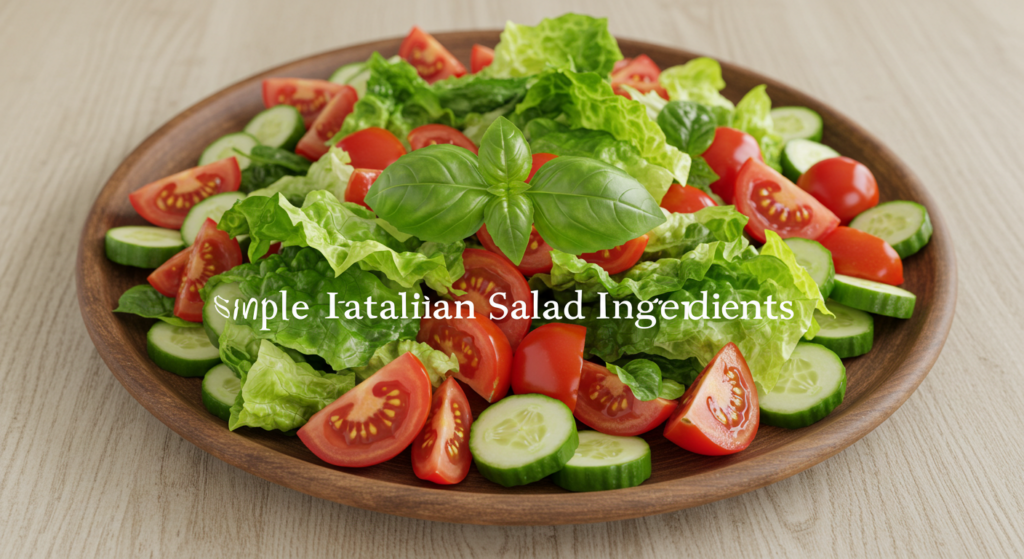
Serving Suggestions and Authentic Pairings Simple Italian Salad
Elevate your table with vibrant colors and bold flavors that turn every meal into an occasion. Thoughtful plating and complementary dishes amplify the dining experience, whether you’re hosting guests or enjoying a quiet night in.
Plating Tricks and Main Course Matches
Arrange greens in wide, shallow bowls to showcase textures. Top with paper-thin red onion shavings for a pop of color and mild bite. A squeeze of fresh lemon juice just before serving brightens earthy notes without overpowering.
| Main Dish | Ideal Pairing | Flavor Bridge |
|---|---|---|
| Chicken Parmesan | Garlic focaccia | Drizzle dressing over bread |
| Lemon-herb pasta | Chilled red wine | Use pasta water in dressing |
| Grilled salmon | Herbed couscous | Add capers to greens |
For authenticity, rub dried oregano between your fingers before sprinkling—this releases essential oils. Combine butter and romaine lettuce varieties for contrasting crunch. Chef Nancy Silverton recommends: “Layer ingredients vertically—it’s visually striking and prevents sogginess.”
Transform casual meals by serving individual portions in mason jars. For formal dinners, garnish with edible flowers near the rim of shared platters. Pair bold red wine-based dressings with rich meats, while citrus-forward versions complement seafood.
Conclusion
Bring Mediterranean vibrancy to your table with a dish that celebrates freshness and flexibility. Crisp romaine, spicy pepperoncini, and sharp parmesan create a bold foundation, while a homemade dressing—brightened with lemon juice—ties everything together effortlessly.
This recipe thrives on simplicity. You can toss it together in minutes, adjusting flavors with a pinch of sugar to soften acidity or a drizzle of olive oil to balance fat content. Pair it with grilled proteins, fold into pasta, or enjoy it solo for a light yet satisfying meal.
Don’t hesitate to make it yours. Swap greens, add roasted nuts, or experiment with herb-infused oils. Share your creations online and inspire others to embrace this adaptable staple. Once you taste the crunch of fresh veggies mingling with tangy dressing, it’ll become a regular star on your menu.
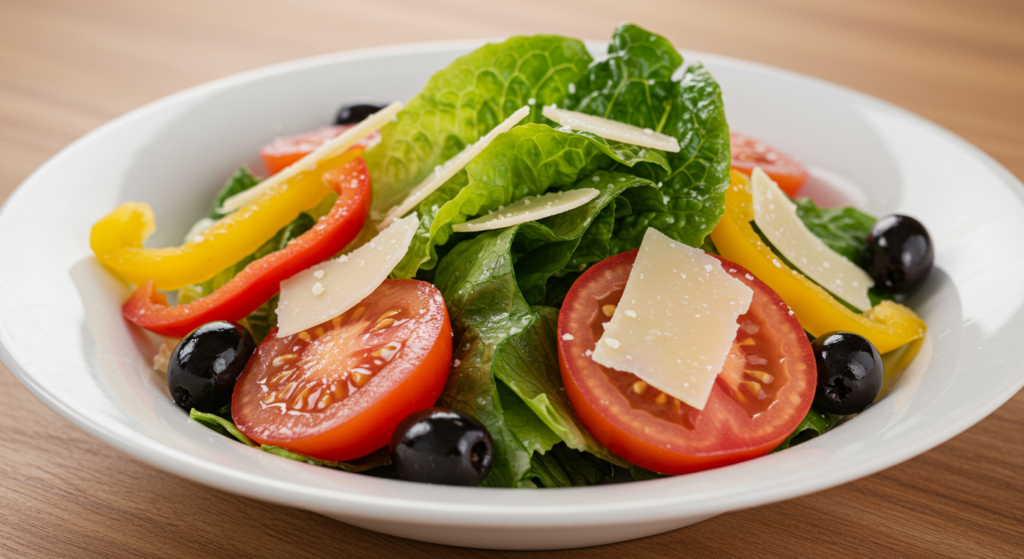
FAQ
Can I substitute red wine vinegar in the dressing?
Yes! Balsamic vinegar or lemon juice work well. Adjust ratios slightly for balanced acidity. For a sweeter twist, try apple cider vinegar with a pinch of sugar.
How do I keep greens crisp after adding dressing?
Toss greens in olive oil first to create a light barrier. Add acidic ingredients like vinegar or lemon juice just before serving to prevent wilting.
What cheese pairs best with this salad?
Freshly grated Parmigiano-Reggiano adds bold flavor. For creaminess, try mozzarella pearls. Vegan? Nutritional yeast mimics cheesy notes without dairy.
Are jarred peppers okay if fresh ones aren’t available?
Absolutely. Roasted red peppers from a jar add smoky depth. Rinse them to reduce excess brine, then pat dry before chopping.
Can I add protein to make it a main dish?
Grilled chicken, chickpeas, or white beans boost protein. For a Mediterranean twist, add flaked tuna or sliced salami.
How long does homemade vinaigrette last?
Store it in an airtight container for up to 1 week. Shake well before use, as olive oil and vinegar may separate over time.
What’s a quick substitute for dried oregano?
Fresh basil or thyme adds herbal brightness. Use 3x more fresh herbs than dried, as their flavors are milder when uncooked.
7 Ingredients for the Best Simple Italian Salad Recipe”
Description
Craving a fresh and flavorful salad that transports you to the heart of Italy? This Simple Italian Salad is a vibrant, Mediterranean-inspired dish bursting with juicy tomatoes, crisp greens, briny olives, and creamy cheese. Tossed in a zesty homemade Italian dressing, this salad is perfect as a light lunch, a side dish, or even a satisfying main course with added protein.
With just a handful of high-quality ingredients, this salad comes together in minutes. Whether you’re serving it alongside pasta, grilled meats, or enjoying it solo, it’s a refreshing and versatile dish that celebrates the beauty of fresh, simple ingredients.
easy-to-follow list of ingredients for your Simple Italian Salad
Fresh Ingredients:
Homemade Italian Dressing:
Optional Add-Ins for Variations:
Nutrition Facts
Servings 4
- Amount Per Serving
- Calories 180kcal
- % Daily Value *
- Total Fat 14g22%
- Saturated Fat 4g20%
- Cholesterol 10mg4%
- Sodium 350mg15%
- Potassium 400mg12%
- Total Carbohydrate 9g3%
- Dietary Fiber 3g12%
- Sugars 4g
- Protein 6g12%
- Vitamin A 2500 IU
- Vitamin C 20 mg
- Calcium 150 mg
- Iron 2 mg
* Percent Daily Values are based on a 2,000 calorie diet. Your daily value may be higher or lower depending on your calorie needs.
Note
This Simple Italian Salad is a vibrant and refreshing dish that combines fresh, crunchy vegetables, creamy mozzarella, and briny olives, all tossed in a tangy homemade dressing.
Packed with essential nutrients like vitamins and minerals, it’s a light, healthy, and delicious option for any meal, perfect for a quick lunch or dinner.

